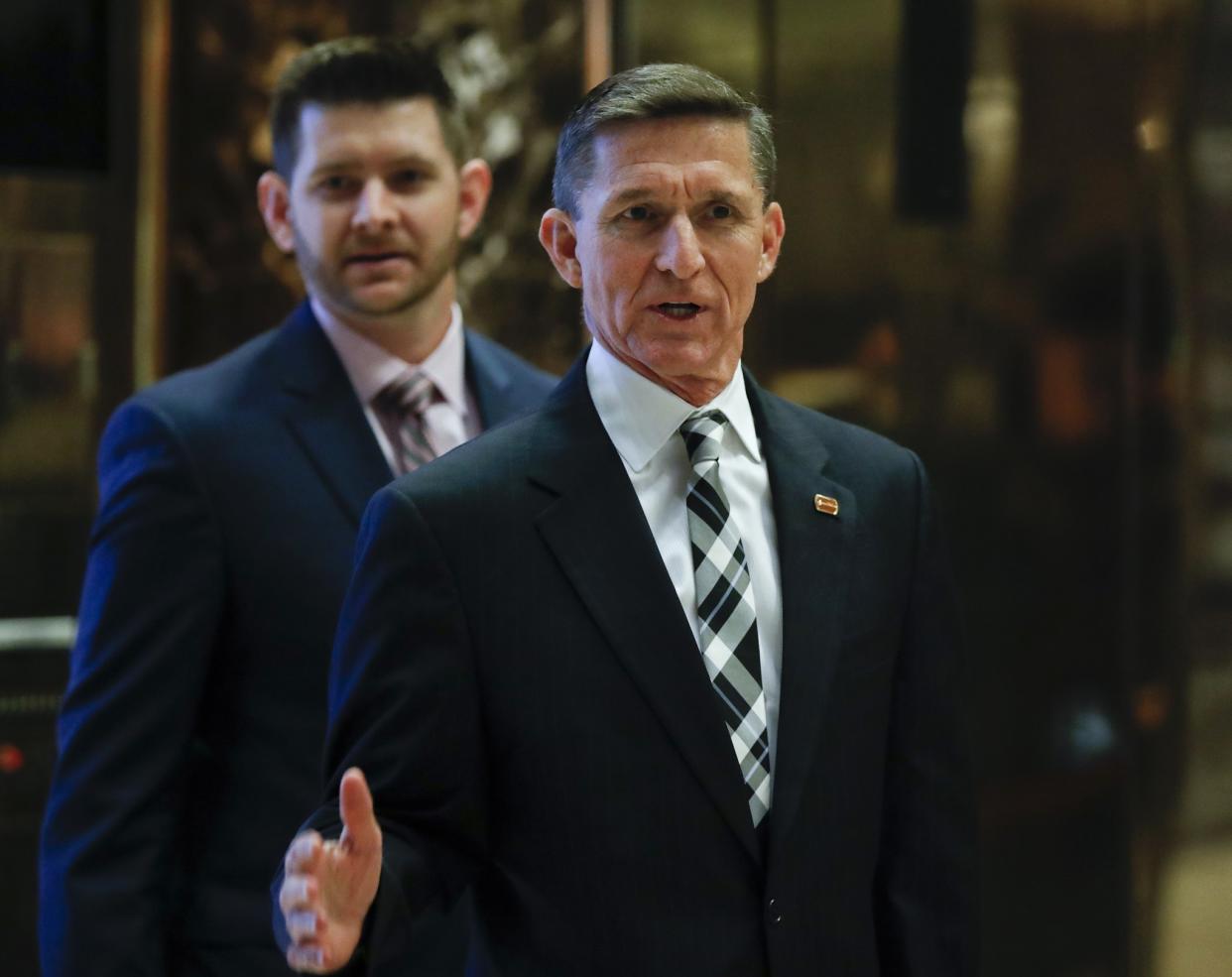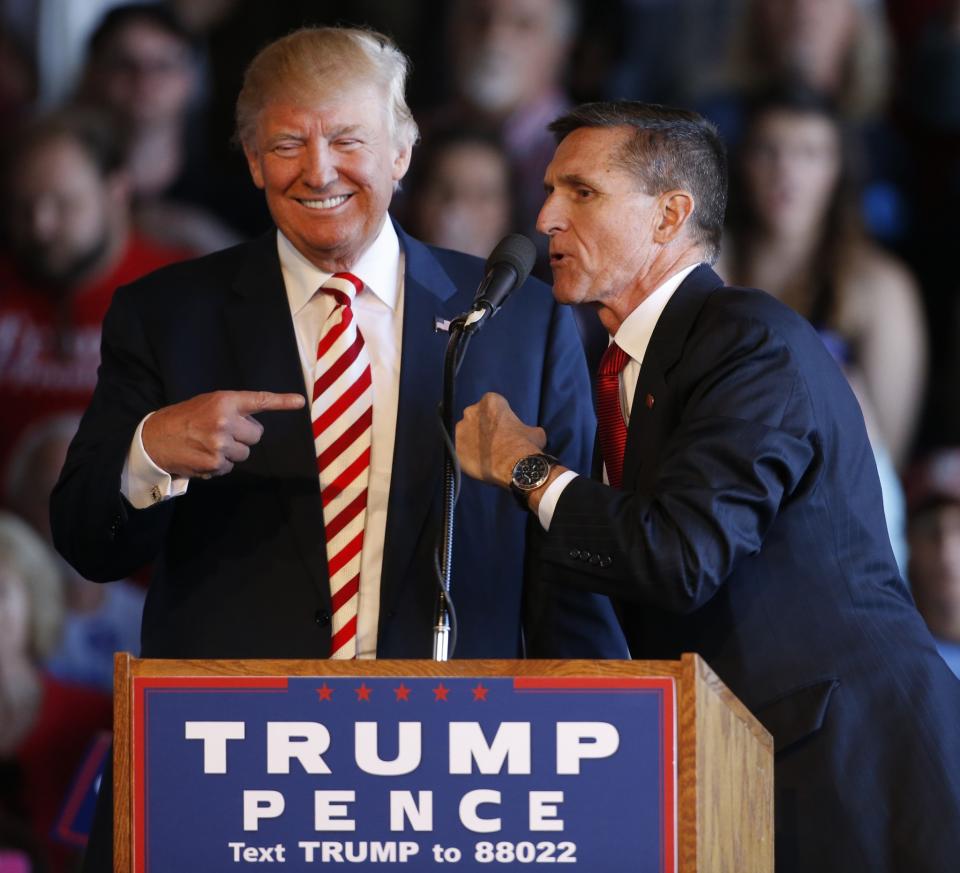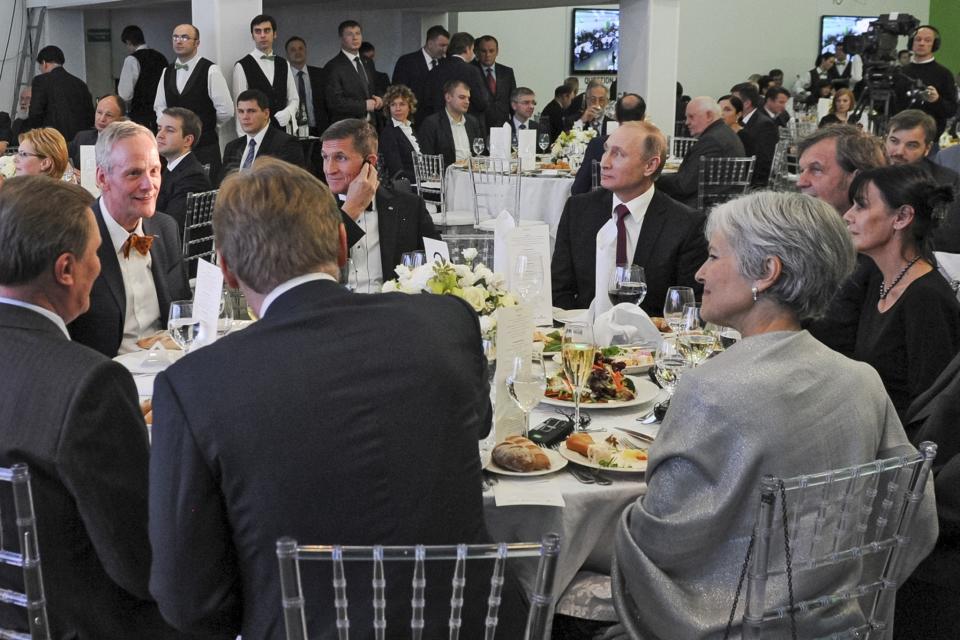Michael Flynn, Trump’s reported pick for national security adviser, sat in on intel briefings — while advising foreign clients

Retired Lt. Gen. Michael Flynn, who has reportedly been offered the role of national security adviser in Donald Trump’s White House, began receiving classified national security briefings last summer while he was also running a private consulting firm that offered “all-source intelligence support” to international clients.
Flynn’s relationship with his overseas clients is coming in for new scrutiny amid recent disclosures that two months ago, during the height of the presidential campaign, his consulting firm, the Flynn Intel Group, registered to lobby for a Dutch company owned by a wealthy Turkish businessman close to President Recep Tayyip Erdogan of Turkey.
Robert Kelley, the chief counsel to the Flynn Intel Group, read a statement from Flynn to Yahoo News on Thursday, promising that “if I return to government service, my relationship with my company will be severed, in accordance with the policy announced by President-elect Trump.”
But critics today dismissed Flynn’s pledge as “Too little, too late,” given that he began sitting in on U.S. intelligence briefings for Trump in August while working for foreign clients. Classified national security briefings are by tradition provided to the major presidential candidates and their top aides.
“This is profoundly troubling and should be disqualifying,” said Norm Eisen, who served as President Obama’s ethics adviser and later as an ambassador to the Czech Republic. He predicted that if Flynn is named as Trump’s national security adviser, “there will be wholesale resignations of national security professionals, and I believe some have already drafted their resignation letters.”
On Wednesday, the White House press secretary, Josh Earnest, said that President Obama had authorized that the President’s Daily Brief (PDB) materials also be provided to Trump, Vice President-elect Mike Pence and “designated” members of Trump’s transition team. The PDB comprises some of the most sensitive intelligence in the U.S. government, beyond the national security briefings Trump received as the Republican nominee.
But White House officials declined to say Thursday whether Flynn — an “executive” member of the Trump transition team and his chief foreign policy adviser during the campaign — was among those so designated. Flynn was not in attendance on Tuesday when Trump received his first PDB briefing at Trump Tower, according to a source familiar with the matter. Trump transition officials did not respond to requests for comment.

The criticism of Flynn over his overseas clients came on a day that the Trump transition team announced a sweeping new conflict-of-interest policy that will require all members of the transition team to sever their relationships with lobbying clients and, if they join the administration, forswear lobbying for five years after ending their government service. It does not apply to past lobbying contracts. A transition official said that “instead of looking backward,” the new policy “looks forward.”
But according to a copy of a Memorandum of Understanding signed on Election Day, and released today by House Democrats, the Trump transition team, as a condition of receiving government briefing materials, was required to provide a statement to White House chief of staff Denis McDonough last week that all designated members of the transition team had disclosed their financial interests and did not have any conflicts of interest.
A Trump transition spokesman did not respond to questions about whether Flynn had made such disclosures. But Rep. Elijah Cummings, the ranking Democrat on the House Oversight and Government Reform Committee, said the terms of the memorandum raise questions about whether Flynn is even eligible to continue to receive national security briefings at this point.
The full extent of Flynn’s overseas business is unclear. In the statement released by his lawyer, Flynn said only that his firm — which he described as a “private business intelligence company” — has unnamed “international and domestic clients.” In a brief telephone interview, Kelley, a former Capitol Hill staffer, declined to specify the issues for which the firm was hired to lobby Congress on behalf of Innova BV, a firm based in Holland and owned by the Turkish businessman, Ekim Alptekin. The lobbying disclosure statement filed with the secretary of the Senate on Sept. 30 states only that Flynn’s firm “will advise client on U.S. domestic and foreign policy” and congressional appropriations bills for the State Department.
Alptekin, according to his LinkedIn profile, serves as chairman of the Turkish American Business Council, is the founder and president of EA Havacilik, an aerospace firm based in Istanbul, and is “commercially active in the real estate and defense industries” through multiple other companies. He also serves as a member of Turkey’s Foreign Economic Relations Board and, in that role, helped coordinate Erdogan’s visit to the United States earlier this year, according to the Daily Caller, which first reported Flynn’s lobbying contract.

Without disclosing his lobbying relationship with the Turkish-owned firm, Flynn published an op-ed in the newspaper the Hill on Election Day, in which he advanced the No. 1 cause of Erdogan’s government: advocating the extradition of Fethullah Gülen, a Turkish exile living in Pennsylvania whom Erdogan has blamed for instigating the failed military coup against his government last summer.
In the op-ed, which ran under the headline “Our ally Turkey is in crisis and needs our support,” Flynn described Gülen as a “shady Islamic mullah,” who runs a “vast global network [that] has all the right markings to fit the description of a dangerous sleeper network. From Turkey’s point of view, Washington is harboring Turkey’s Osama bin Laden.”
This is the not the first time questions have been raised about Flynn’s overseas ties. Last December, Flynn, who served as director of the Defense Intelligence Agency from 2012 until 2014, flew to Moscow to participate in the 10th anniversary of RT, the Russian government propaganda network. He gave an interview to one of its anchors and attended a gala dinner where he sat at the same table as Russian President Vladimir Putin.
In a testy exchange with Yahoo News during the Republican Convention in Cleveland in July, Flynn acknowledged that he was paid through his speakers bureau to attend the RT event, but he declined to say how much.
What was striking, according to ethics experts, is that given his overseas consulting business, Flynn began sitting in on classified intelligence briefings with Trump last summer. Flynn was reportedly so assertive during the initial briefing in August, peppering the briefers with rapid-fire questions, that Trump’s adviser Gov. Chris Christie of New Jersey, who also attended the briefing, was prompted to try to calm him down by placing a hand on his arm.
Danielle Brian, executive director of the Project on Government Oversight, an outside watchdog group, said that she finds it “deeply disturbing” that Flynn attended these briefings at a time that he was representing foreign clients with interests before the U.S. government. “It’s exactly the kind of foreign entanglements our laws are designed to prevent,” she said.
One retired military officer who has advised both Republican and Democratic presidents said of the allegations about Flynn: “If this is true, it’s a disqualifying conflict of interest — if not by ethics laws, certainly in the spirit of conflict of interest, not to mention security regulations. We should be deeply concerned about his ethical judgment, but more specifically how can he possibly provide unbiased advice to the POTUS about Turkey and Russia, when he’s taken money from both.”



